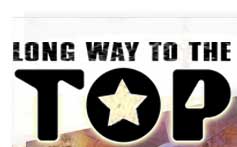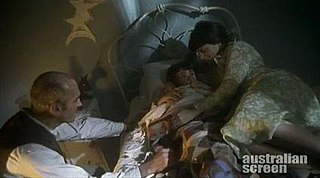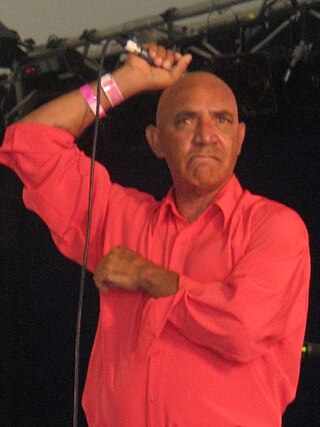Related Research Articles

Paul Maurice Kelly is an Australian rock music singer-songwriter and guitarist. He has performed solo, and has led numerous groups, including the Dots, the Coloured Girls, and the Messengers. He has worked with other artists and groups, including associated projects Professor Ratbaggy and Stardust Five. Kelly's music style has ranged from bluegrass to studio-oriented dub reggae, but his core output straddles folk, rock and country. His lyrics capture the vastness of the culture and landscape of Australia by chronicling life about him for over 30 years. David Fricke from Rolling Stone calls Kelly "one of the finest songwriters I have ever heard, Australian or otherwise". Kelly has said, "Song writing is mysterious to me. I still feel like a total beginner. I don't feel like I have got it nailed yet."

Indigenous music of Australia comprises the music of the Aboriginal and Torres Strait Islander peoples of Australia, intersecting with their cultural and ceremonial observances, through the millennia of their individual and collective histories to the present day. The traditional forms include many aspects of performance and musical instrumentation that are unique to particular regions or Aboriginal Australian groups; and some elements of musical tradition are common or widespread through much of the Australian continent, and even beyond. The music of the Torres Strait Islanders is related to that of adjacent parts of New Guinea. Music is a vital part of Indigenous Australians' cultural maintenance.

Clinton Walker is an Australian writer, best known for his works on popular music. He is known for his books Highway to Hell, Buried Country, History is Made at Night (2012), and others. He has also written on other subjects, in books such as Football Life (1998) and Golden Miles (2005), and has worked extensively as a journalist and in television.

Archibald William Roach was an Australian singer-songwriter and Aboriginal activist. Often referred to as "Uncle Archie", Roach was a Gunditjmara and Bundjalung elder who campaigned for the rights of Aboriginal and Torres Strait Islander people. His wife and musical partner was the singer Ruby Hunter (1955–2010).

Australian country music is a part of the music of Australia. There is a broad range of styles, from bluegrass, to yodeling to folk to the more popular. The genre has been influenced by Celtic and English folk music, the Australian bush ballad tradition, as well as by popular American country music. Themes include: outback life, the lives of stockmen, truckers and outlaws, songs of romance and of political protest; and songs about the "beauty and the terror" of the Australian bush.

Long Way to the Top was a six-part weekly Australian Broadcasting Corporation (ABC) documentary film series on the history of Australian rock and roll, from 1956 to the modern era, it was initially broadcast from 8 August to 12 September 2001. One of its writers, James Cockington, provided a book tie-in, Long Way to the Top: Stories of Australian Rock & Roll (2001). Another series writer, and interviewer, Clinton Walker, compiled a 2-disc CD soundtrack album, Long Way to the Top: Original Soundtrack from the ABC-TV Series, by Various Artists, which featured in the show. It peaked at No. 9 on the ARIA Albums Chart. A year later a related national concert tour followed.

Ruby Charlotte Margaret Hunter, also known as Aunty Ruby, was an Aboriginal Australian singer, songwriter and guitarist, and the life and musical partner of Archie Roach.
Bart Willoughby is an Aboriginal Australian musician, noted for his pioneering fusion of reggae with Indigenous Australian musical influences, and for his contribution to growth of Indigenous music in Australia.
Kevin Daniel Carmody, better known by his stage name Kev Carmody, is an Aboriginal Australian singer-songwriter and musician, a Murri man from northern Queensland. He is best known for the song "From Little Things Big Things Grow", which was recorded with co-writer Paul Kelly for their 1993 single. It was covered by the Get Up Mob in 2008 and peaked at number four on the Australian Recording Industry Association (ARIA) singles charts.

One Night the Moon is a 2001 Australian musical non-feature film starring husband and wife team Paul Kelly, a singer-songwriter, and Kaarin Fairfax, a film and television actress, along with their daughter Memphis Kelly. The film was directed by Rachel Perkins and co-written by Perkins with John Romeril. In 2009 Romeril adapted the script as a musical theatre work.

"From Little Things Big Things Grow" is a protest song recorded by Australian artists Paul Kelly & The Messengers on their 1991 album Comedy, and by Kev Carmody on his 1993 album Bloodlines. It was released as a CD single by Carmody and Kelly in 1993 but failed to chart. The song was co-written by Kelly and Carmody, and is based on the story of the Gurindji strike and Vincent Lingiari as part of the Indigenous people's struggle for land rights in Australia and reconciliation.
Kasper Gus Ntjalka Williams, known as Gus Williams, was an Aboriginal Australian country music singer who lived in Central Australia. He was known not only for his work in Aboriginal country music, but also as a leader of his people. He created the first electric country band in the Northern Territory, the Warrabri Country Bluegrass Band.
Roger Knox is an Australian country singer, known as the Black Elvis and the Koori King of Country.

Auriel Andrew was an award-winning Arrernte country musician from the Northern Territory of Australia.
Ntaria Choir, formerly known as Ntaria Ladies Choir, Hermannsburg Ladies Choir, Hermannsburg Choir], and various other names, is a choir of Australian Aboriginal people from Hermannsburg in Central Australia. The members of the choir are Arrernte people from the area and they sing a mixture of English, Arrente, and Pitjantjatjara.

William Victor Simms, known as Vic Simms and Vicki Simms, is an Australian singer and songwriter. He is from La Perouse, New South Wales, and is a Bidjigal man.
Dougie Young was a singer and songwriter from South West Queensland. Young had a white father and a Gurnu mother.
Allan Moarywaalla Barker, known as Black Allan Barker, is a singer and songwriter from Port Hedland. He described his music as "Aboriginal grassroots blues" and is about Aboriginal oppression and rights. Barker was a co-founder of Greenpeace Australia. Barker only recorded one album, 1983's Fire Burning (Abmusic) which is now rare to find. "Black Al" was well known for his performing in Sydney's Central Station tunnel in 1991 where he sang in language whilst his son Alan Jr accompanied him on didgeridoo. Barker spent some time in Nimbin during the 1990s and was involved with local Aboriginal youth in cultural and musical pursuits.
Harry "Buck" Williams and Wilga Munro, known as Harry and Wilga Williams, were Aboriginal Australian musicians who performed professionally between the 1960s and 1980s, playing Aboriginal country music. They formed the band the Country Outcasts, also known as Harry Williams and the Country Outcasts.
Our Home, Our Land is a compilation album released in Australia by CAAMA in 1995. It was released to celebrate the victory in the Mabo case. It focused on the importance of land to the Aboriginal and Torres Strait Islander beliefs. It was nominated for a 1996 ARIA Award for Best Indigenous Release.
References
- ↑ Kirkbright, Christopher J. (2000). Study Guide: Buried Country: the story of Aboriginal country music (PDF). Film Australia. p. 73. ISBN 1-86403-152-2. Archived from the original (PDF) on 29 July 2008. Retrieved 11 October 2008.
- ↑ Stuart Coupe, (19 August 2000), Black and blues: Buried Country, Sydney Morning Herald: Spectrum, p. 3. Retrieved 15 May 2013
- ↑ Karl Neuenfeldt, (September 2001), Review: Buried Country: The Story of Aboriginal Country Music by Clinton Walker, API review of books, (Perth, Australian Public Intellectual Network) Archived 15 December 2013 at the Wayback Machine , ISSN 1833-0932
- ↑ Combined Review: Buried Country, (2002), Metro Magazine, Issue 134, ISSN 0312-2654
- ↑ Buried Country at IMDb
- ↑ "CD: Buried country : the story of Aboriginal country music, original film soundtrack". Australian Music Centre. Retrieved 3 November 2022.
- ↑ "Album". Buried Country. Retrieved 3 November 2022.
- ↑ "THE SHOW". Buried Country. 26 January 2016. Retrieved 3 November 2022.